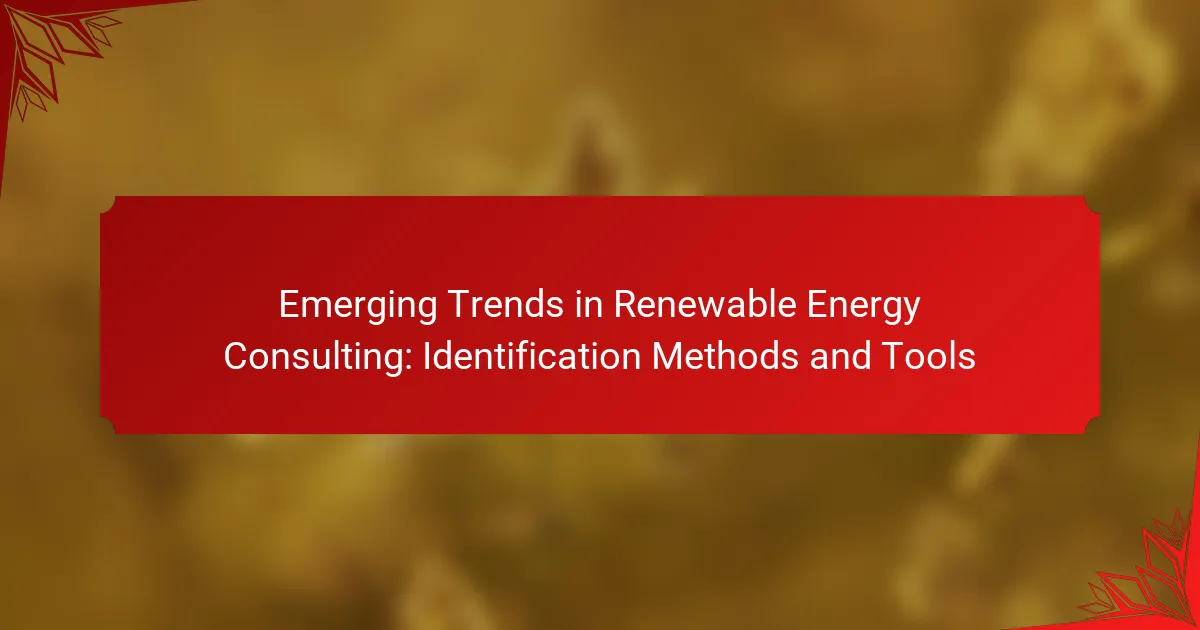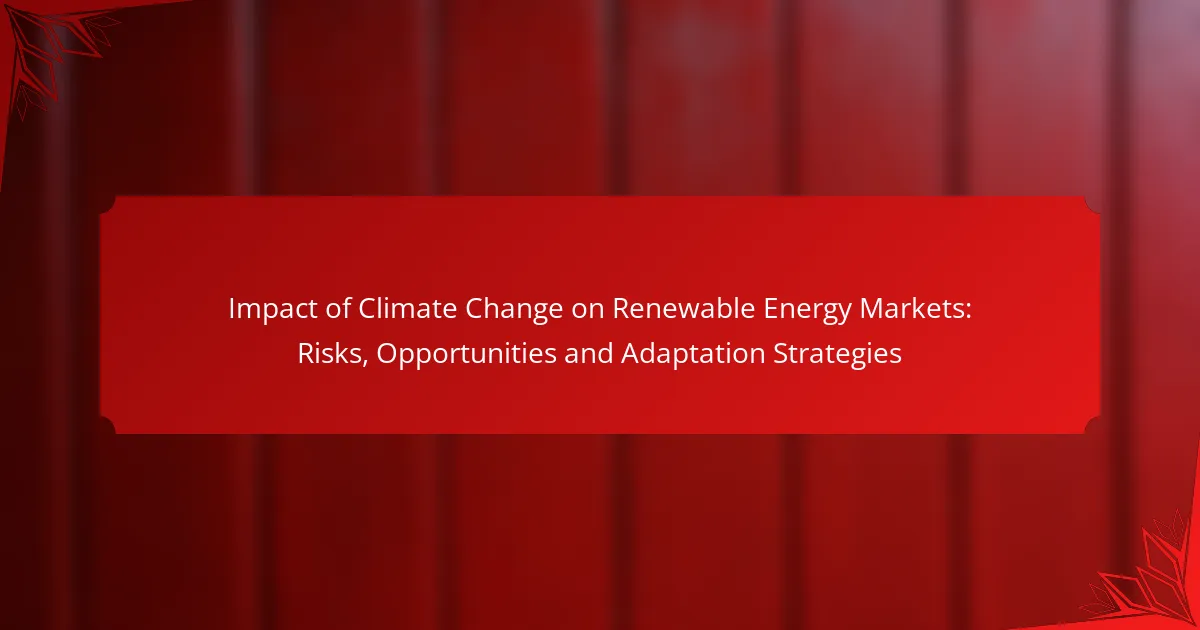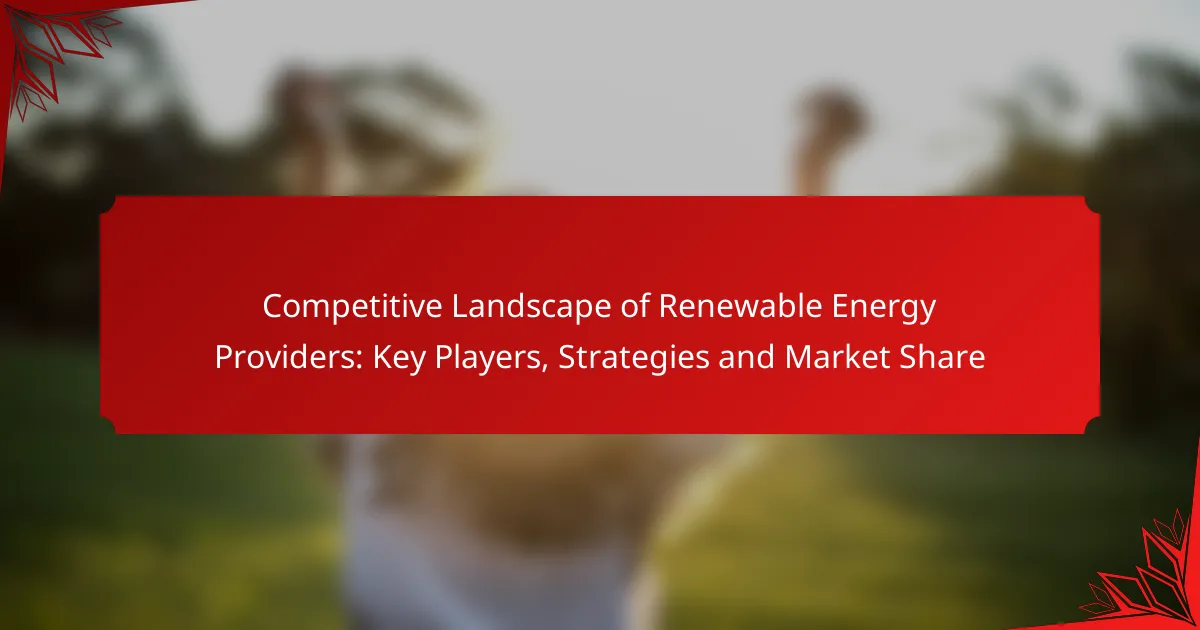As the renewable energy sector evolves, consulting practices are adapting to incorporate innovative solutions that drive efficiency and sustainability. By leveraging advancements in energy storage, artificial intelligence, and decentralized systems, businesses can identify opportunities for integrating renewable sources into their operations. Utilizing essential tools such as energy modeling software and data analytics platforms, consultants can optimize energy systems and enhance project management capabilities.
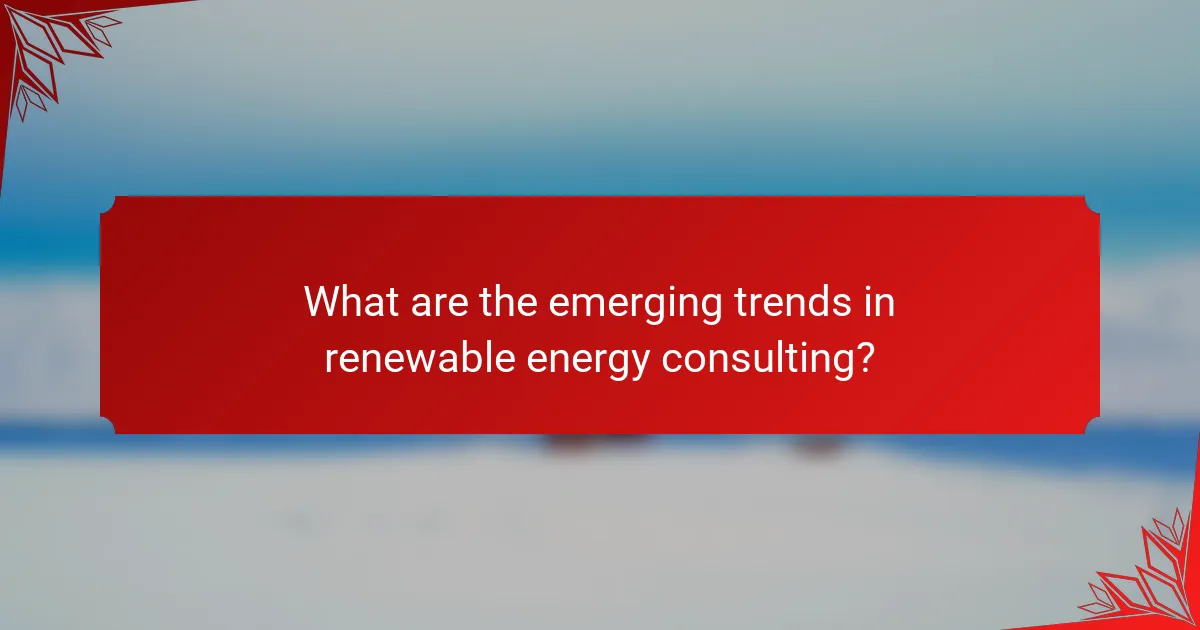
What are the emerging trends in renewable energy consulting?
Emerging trends in renewable energy consulting focus on innovative solutions that enhance efficiency and sustainability. Key developments include advancements in energy storage, the integration of artificial intelligence, and the rise of decentralized energy systems.
Increased focus on energy storage solutions
Energy storage solutions are becoming critical as renewable energy sources like solar and wind are intermittent. Technologies such as lithium-ion batteries and pumped hydro storage are gaining traction, enabling better management of energy supply and demand.
Consultants should evaluate the specific needs of their clients when recommending storage solutions. Factors like capacity, discharge rates, and lifecycle costs are essential considerations. For instance, a commercial solar installation might benefit from a battery system that can store energy for peak usage hours, potentially reducing electricity costs by a significant margin.
Integration of AI and machine learning tools
Artificial intelligence (AI) and machine learning are transforming renewable energy consulting by providing data-driven insights for optimizing energy systems. These technologies can analyze vast amounts of data to predict energy production and consumption patterns, improving decision-making.
Consultants can leverage AI tools for predictive maintenance, which helps in identifying potential failures before they occur. This proactive approach can reduce downtime and maintenance costs significantly. For example, using AI algorithms, a wind farm can optimize turbine performance by adjusting operations based on real-time weather data.
Growth of decentralized energy systems
Decentralized energy systems, including microgrids and community solar projects, are gaining popularity as they empower local energy production and consumption. This trend allows communities to enhance energy resilience and reduce reliance on centralized power grids.
Consultants should guide clients in assessing the feasibility of decentralized systems based on local regulations, available resources, and community engagement. For example, a neighborhood could implement a community solar project, allowing residents to share the benefits of renewable energy while lowering individual energy costs. Understanding local incentives and policies can further enhance project viability.
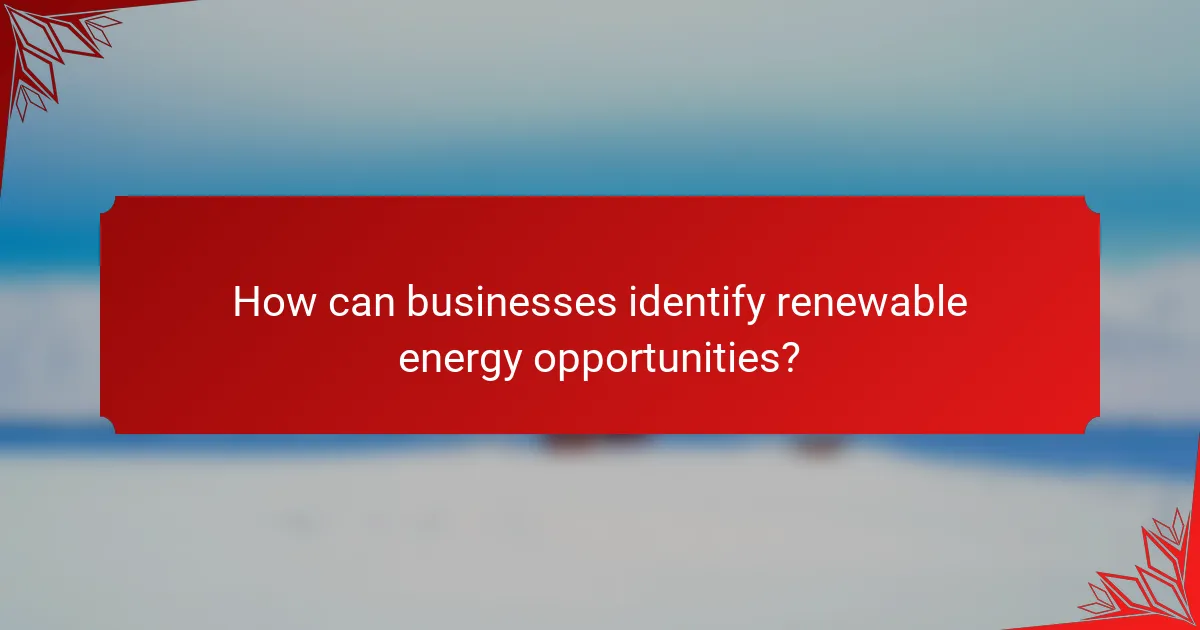
How can businesses identify renewable energy opportunities?
Businesses can identify renewable energy opportunities by assessing their energy consumption patterns and exploring available technologies. This process involves analyzing current energy usage, potential savings, and the feasibility of integrating renewable sources into their operations.
Conducting energy audits
Energy audits are systematic evaluations of energy use within a business. They help identify inefficiencies and highlight areas where renewable energy solutions can be implemented. Audits can reveal potential for solar panel installations, energy-efficient lighting, or heating systems.
To conduct an effective energy audit, businesses should gather data on energy bills, equipment usage, and operational hours. Engaging a certified auditor can provide insights and recommendations tailored to specific needs, often leading to significant cost savings.
Utilizing geographic information systems (GIS)
Geographic Information Systems (GIS) are powerful tools that help businesses visualize and analyze spatial data related to energy resources. By mapping out solar irradiance, wind patterns, and existing infrastructure, companies can identify optimal locations for renewable energy projects.
GIS can also assist in assessing land use regulations and environmental impacts, which are crucial for project feasibility. Businesses should consider integrating GIS analysis into their planning processes to make informed decisions about renewable energy investments.
Engaging with local energy consultants
Local energy consultants possess valuable knowledge about regional energy markets, incentives, and regulations. They can provide tailored advice on renewable energy opportunities specific to the local context, such as available grants or tax credits.
When engaging with consultants, businesses should prepare by outlining their energy goals and budget constraints. This collaboration can lead to customized strategies that align with local resources and regulatory frameworks, maximizing the benefits of renewable energy adoption.

What tools are essential for renewable energy consulting?
Essential tools for renewable energy consulting include energy modeling software, data analytics platforms, and project management tools. These resources help consultants optimize energy systems, analyze data effectively, and manage projects efficiently.
Energy modeling software
Energy modeling software simulates the performance of renewable energy systems, allowing consultants to predict energy output, costs, and environmental impacts. Popular tools like HOMER and RETScreen help in assessing various scenarios and optimizing system design.
When selecting energy modeling software, consider factors such as user-friendliness, compatibility with existing systems, and the ability to model specific technologies like solar, wind, or biomass. A good practice is to test several options to find the best fit for your projects.
Data analytics platforms
Data analytics platforms are crucial for processing and interpreting large datasets related to energy consumption and production. Tools like Tableau and Power BI enable consultants to visualize trends and make data-driven decisions.
Choosing the right data analytics platform involves evaluating its integration capabilities with other tools, ease of use, and the depth of analytics features. Ensure the platform can handle the specific data types relevant to renewable energy, such as weather patterns and energy usage statistics.
Project management tools
Project management tools streamline the planning, execution, and monitoring of renewable energy projects. Software like Asana and Trello helps teams collaborate, track progress, and manage resources effectively.
When selecting project management tools, prioritize features such as task assignment, deadline tracking, and reporting capabilities. A clear project timeline and defined roles can significantly enhance team efficiency and project success.

What criteria should be used to select consulting services?
When selecting consulting services for renewable energy projects, consider factors such as industry experience, client feedback, and recognized certifications. These criteria help ensure that the consultants possess the necessary expertise and credibility to deliver effective solutions.
Experience in specific renewable sectors
Consultants should have proven experience in the specific renewable energy sectors relevant to your project, such as solar, wind, or bioenergy. Look for firms that have successfully completed projects similar to yours, as this indicates familiarity with the unique challenges and regulations in those areas.
For example, a consulting firm that has worked extensively in solar energy will understand the nuances of solar panel installation, financing options, and local incentives. This specialized knowledge can significantly enhance project outcomes.
Client testimonials and case studies
Client testimonials and case studies provide insight into a consulting firm’s track record and effectiveness. Seek out firms that can share detailed case studies showcasing their previous work, including challenges faced and solutions implemented.
Positive testimonials from past clients can also indicate reliability and satisfaction. Look for feedback that highlights the consultant’s ability to meet deadlines, stay within budget, and deliver results that align with client expectations.
Certifications and industry recognition
Certifications and industry recognition are important indicators of a consulting firm’s credibility and expertise. Look for certifications from recognized organizations, such as the International Renewable Energy Agency (IRENA) or the American Solar Energy Society (ASES).
Additionally, awards or recognition from industry bodies can signal a firm’s commitment to excellence and innovation in renewable energy consulting. This can provide additional assurance that the firm adheres to high standards and best practices in the field.
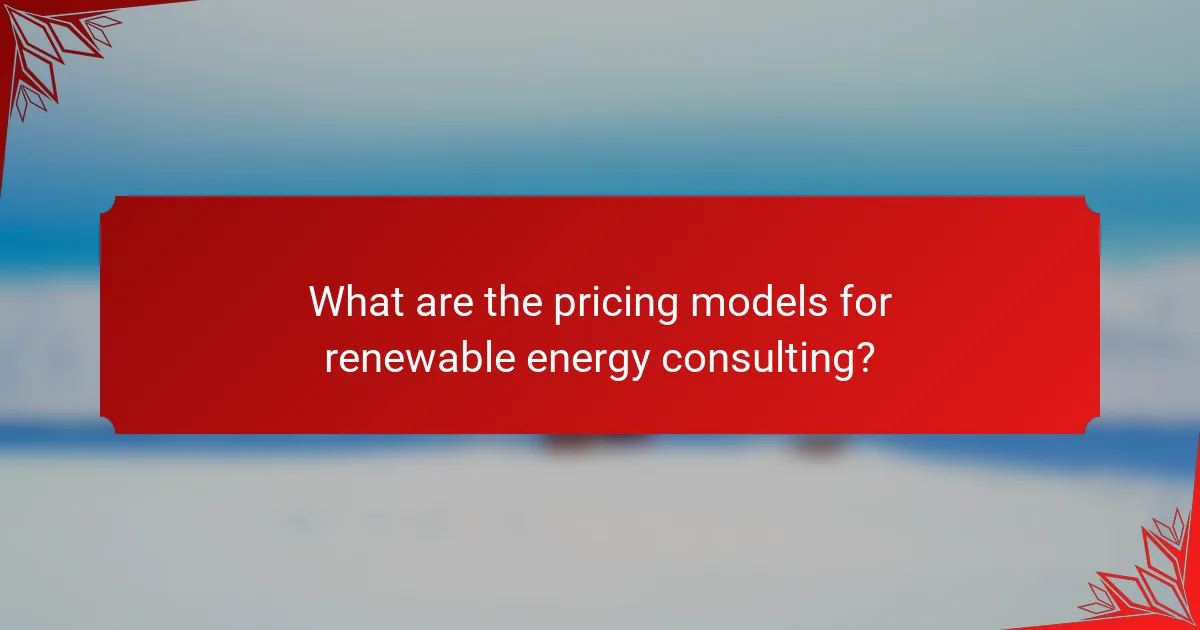
What are the pricing models for renewable energy consulting?
Renewable energy consulting pricing models typically include hourly rates and fixed project fees. Each model has its advantages and considerations, depending on the scope of work and client needs.
Hourly rates for consulting services
Hourly rates for renewable energy consulting can vary widely based on the consultant’s expertise, location, and the complexity of the project. Rates may range from around $100 to $300 per hour, with specialized consultants potentially charging more.
When opting for hourly rates, clients should consider the estimated number of hours required for the project. It’s advisable to discuss and agree on a cap or maximum budget to avoid unexpected costs.
Fixed project fees
Fixed project fees provide a clear cost structure for renewable energy consulting, making budgeting easier for clients. These fees are typically based on the project’s scope, deliverables, and timeline, often ranging from a few thousand to tens of thousands of dollars.
Choosing a fixed fee model can be beneficial for well-defined projects, as it minimizes the risk of cost overruns. However, clients should ensure that the project specifications are thoroughly detailed in the contract to avoid misunderstandings later on.
